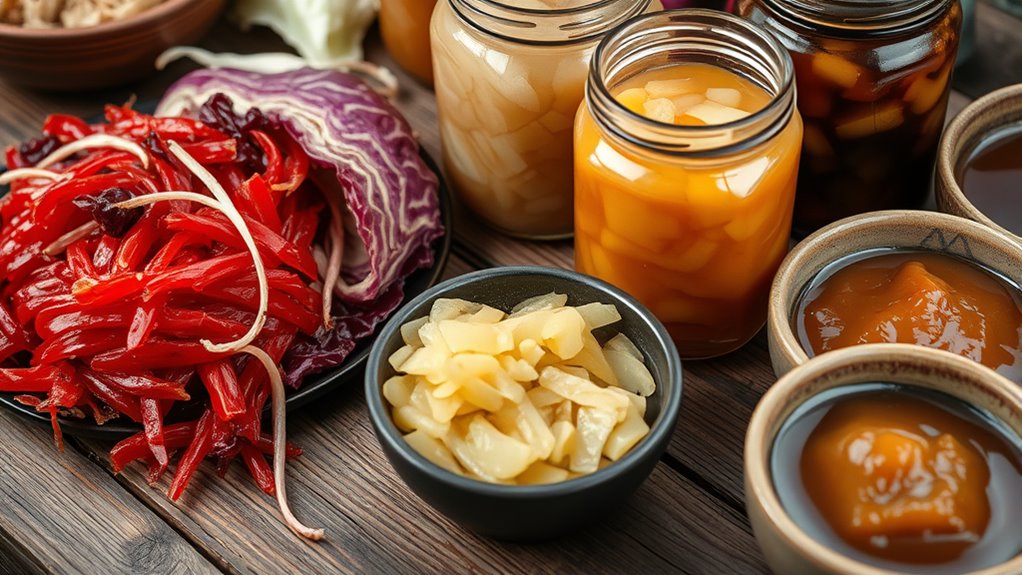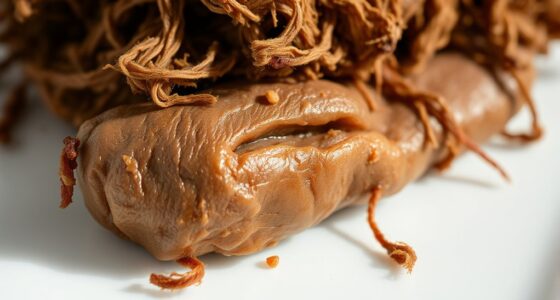Fermented foods influence your odor through their diverse microbes and the volatile compounds they produce during digestion. These microbes release substances like sulfur, acids, and alcohols, which can affect both body and breath odor. The impact varies based on your individual digestion, the type of fermented foods, and how much you consume. To better understand how to enjoy these foods while managing odors, there’s more to discover below.
Key Takeaways
- Fermented foods produce volatile compounds like sulfur and acids that can influence body odor and breath freshness.
- Microbial activity during fermentation determines specific scent profiles, from mild tangy to pungent or sour odors.
- Consuming certain fermented foods, such as kimchi or cheese, may temporarily intensify body or breath odor.
- Proper storage, hygiene, and moderation can help minimize lingering smells from fermented foods.
- Individual digestion and metabolism significantly impact how fermented foods affect odor emission and duration.
The Science Behind Fermented Foods and Body Odor

Although fermented foods are praised for their health benefits, they can also influence body odor in unexpected ways. When you eat these foods, your body digests the complex bacteria and yeasts they contain. These microorganisms produce byproducts like volatile compounds and acids during fermentation. Some of these compounds, such as short-chain fatty acids, can be absorbed into your bloodstream. Once in circulation, they may be released through sweat glands, impacting your body odor. The process isn’t just about the foods themselves but how your body metabolizes these compounds. Different fermented foods contain varying types and amounts of these substances, which can alter your natural scent. This complex interaction explains why some people notice changes in their body odor after consuming fermented foods regularly. Additionally, individual differences in digestion and metabolism may influence how significantly these compounds affect body odor.
Microbes in Fermented Foods and Their Role in Odor Changes

The microbes in fermented foods directly influence their odors by producing specific compounds during fermentation. You’ll notice how different microbial communities create distinct scents based on their metabolic activities. Understanding these microbes and their byproducts helps explain the odor changes you experience with various fermented foods. Regularly assessing and rotate items during fermentation can also impact the microbial diversity and resulting odors.
Microbial Composition and Odor
Microbes play an essential role in shaping the odors of fermented foods, as they produce a variety of volatile compounds during fermentation. The specific microbes present determine which compounds are generated, influencing the final aroma. For example, lactic acid bacteria often produce mild, tangy scents, while certain yeasts generate fruity or alcoholic notes. The microbial composition varies based on ingredients, environment, and fermentation methods, leading to diverse odors across different foods. Some microbes produce sulfur-containing compounds that create pungent or rotten smells, while others release esters that add fruity nuances. Understanding the microbial makeup helps explain why fermented foods smell the way they do and allows producers to manipulate microbial communities for desired aromas. Additionally, data analytics can be used to monitor and optimize fermentation processes for consistent flavor profiles. Your awareness of these microbes clarifies how microbial diversity impacts fermentation odors.
Fermentation Byproducts Impact
Fermentation byproducts are key factors that influence the aroma of fermented foods, as they are directly produced by the microbes involved in the process. These byproducts include alcohols, acids, esters, and sulfur compounds, each contributing distinct scents. For example, lactic acid gives a tangy aroma, while esters add fruity notes. Microbes like yeast and bacteria metabolize sugars and proteins, generating these compounds and shaping the final smell. The specific microbes present determine which byproducts form, affecting the odor profile. Variations in fermentation conditions, such as temperature and duration, also influence byproduct production. Recognizing how microbes produce these compounds helps you understand why different fermented foods smell unique, from sour to savory, and how these odors evolve during fermentation.
Common Fermented Foods and Their Odor Impact

You’ll notice that cheese often has a sharp, pungent aroma that can vary from mild to intense. Kimchi emits a distinctive fermentation smell that might surprise you at first but adds to its appeal. Meanwhile, yogurt tends to have a gentle, mild scent that’s less likely to cause odor concerns. Additionally, the color accuracy of fermented foods can influence how their freshness and quality are perceived visually, impacting overall appeal.
Cheese and Its Pungency
Cheese is renowned for its diverse flavors and textures, but its pungency can also be quite pronounced, often evoking strong reactions. This intensity results from compounds like ammonia, sulfur, and fatty acids released during aging. You’ll notice that certain cheeses, such as blue cheese or aged cheddar, emit more robust odors. Factors influencing pungency include:
- The type of bacteria and molds involved in fermentation
- The aging process and duration
- The specific milk source used
- The fermentation process can produce state-specific flavor profiles, which contribute to the overall pungency.
These elements create complex aromatic profiles that can be polarizing. While many cheese lovers appreciate its depth, others find the smell overpowering. Ultimately, cheese’s pungency is a testament to its rich fermentation history and unique character, making it both a culinary delight and an olfactory challenge.
Kimchi’s Fermentation Aroma
Kimchi’s fermentation aroma offers a vivid example of how complex odors develop through microbial activity. As the cabbage and vegetables ferment, microbes like lactic acid bacteria and yeasts break down sugars and proteins, producing a mix of sulfur compounds, organic acids, and alcohols. These chemicals create kimchi’s signature pungency—sharp, sour, and sometimes spicy notes. The aroma intensifies over time, reflecting the ongoing microbial processes. Unlike milder fermented foods, kimchi’s scent can be bold and penetrating, often described as funky or sour. This aroma not only signals freshness but also the depth of fermentation. Your nose detects a rich interplay of odors that reveal the lively microbial activity, making kimchi’s scent a distinctive marker of its fermentation stage and flavor profile. Microbial activity plays a crucial role in shaping the aroma’s complexity and character.
Yogurt’s Mild Scent
Yogurt’s scent is particularly mild and subtle compared to other fermented foods, reflecting a controlled fermentation process dominated by beneficial bacteria like Lactobacillus. This process produces minimal byproducts, resulting in a clean, fresh aroma that many find appealing. The gentle scent is often associated with its smooth texture and creamy appearance, making it less intrusive in social settings. Additionally, the specific formulations and strains used can influence the odor profile, often resulting in a more vetted and pleasant aroma. The limited production of volatile sulfur compounds, the dominance of lactic acid bacteria, which suppress stronger odors, and the short fermentation period that prevents overly pungent smells all contribute to yogurt’s mild odor. These elements ensure yogurt maintains its pleasant, unobtrusive scent, making it a versatile addition to various diets without overwhelming your senses.
How Fermented Foods Influence Breath Freshness

While fermented foods are often praised for their health benefits, their impact on breath freshness can be complex. Some fermented foods, like yogurt or kefir, can help reduce bad breath by introducing beneficial bacteria that combat odor-causing bacteria. However, others, such as sauerkraut or kimchi, contain strong aromas that might linger in your mouth and cause bad breath temporarily. The key is how these foods interact with your oral bacteria and digestion. For example, the table below highlights common fermented foods and their effects on breath:
| Fermented Food | Effect on Breath |
|---|---|
| Yogurt | Improves freshness |
| Kimchi | May cause temporary odor |
| Kombucha | Neutral or slightly sour |
Understanding these effects helps you choose fermented foods that support both health and fresh breath. Additionally, essential oils such as peppermint or tea tree oil can be used to freshen breath and combat odors effectively.
Personal Factors That Affect Odor Response to Fermented Foods

Your body’s unique composition plays a significant role in how fermented foods affect your breath odor. Factors such as your metabolism, oral hygiene, and digestive health influence how these foods are processed and how their odors are emitted. For example, a faster metabolism might break down compounds more quickly, reducing odor duration. Good oral hygiene can minimize bacteria that produce strong smells, while digestive health impacts how thoroughly fermented foods are digested. Personal differences also include:
- Genetic factors that influence enzyme activity related to odor compounds
- Dietary habits that affect gut flora and fermentation processes
- Hydration levels that impact saliva production and odor dilution
- Microbial composition in your gut can also alter how fermented foods are broken down and the resulting odors.
Strategies to Minimize Unwanted Odor From Fermented Foods

To minimize unwanted odor from fermented foods, start by maintaining good oral hygiene practices, such as brushing and flossing regularly, to reduce bacteria that produce strong smells. Proper storage is also key; keep fermented foods sealed tightly and refrigerated to slow odor development. When preparing dishes, rinse fermented ingredients thoroughly to remove excess salts and acids that can intensify odors. Incorporate odor-neutralizing ingredients like fresh herbs, lemon juice, or vinegar to mask strong smells. Additionally, use ventilation—run a fan or open windows—to disperse odors during and after fermentation or meal preparation. Proper handling and storage can considerably reduce lingering smells in your kitchen and on your clothes, helping you enjoy fermented foods without unwanted odor issues. Ensuring proper air circulation in your kitchen can further enhance odor control and improve overall air quality during food preparation.
Balancing Health Benefits and Odor Concerns

Balancing the health benefits of fermented foods with odor concerns requires mindful choices. To enjoy these benefits without overwhelming smells, focus on moderation and selection. Picking milder options like yogurt or miso can provide probiotics without strong odors. Proper storage can also minimize lingering scents, keeping your environment fresh. Additionally, paying attention to preparation methods, such as rinsing or cooking, helps reduce odor intensity. Consider these strategies:
- Choose fermented foods with milder aromas
- Store them in airtight containers
- Incorporate them into dishes that mask odors
Tips for Enjoying Fermented Foods Without Lingering Smells

Enjoying fermented foods without leaving lingering smells can be simple with a few practical tips. First, eat smaller portions to minimize odor impact. Chew thoroughly, as this helps your body digest better and reduces the chance of strong smells escaping. Drinking plenty of water during and after your meal can dilute odors and flush out smell-causing compounds. Use airtight containers or cover leftovers tightly to contain any residual smell. Consuming fermented foods with fresh herbs or citrus can help mask odors naturally. Good oral hygiene—brushing your teeth, flossing, or rinsing with mouthwash—can also keep your breath fresh. Finally, airing out your space after eating helps eliminate lingering smells faster. With these strategies, you can enjoy fermented foods without worrying about lasting odors.
Frequently Asked Questions
Can Fermented Foods Cause Long-Term Body Odor Changes?
You might wonder if fermented foods can cause long-term body odor changes. They can influence your body’s scent temporarily because of the probiotics and compounds they contain. However, in most cases, these effects are short-lived and tend to normalize once your body adjusts. If you notice persistent odor changes, it’s a good idea to evaluate your overall diet, hydration, and hygiene practices, and consult a healthcare professional if needed.
Do All Fermented Foods Impact Odor Equally?
While it’s tempting to think all fermented foods influence your scent equally, that’s not quite the case. You’re more likely to notice differences based on the specific ingredients and fermentation process. Some foods, like yogurt or sauerkraut, may cause subtle changes, while others with stronger profiles, like kimchi or certain cheeses, could have a more noticeable impact. Your body’s response varies, so not all fermented fare affects odor in the same way.
Are There Specific Fermented Foods That Reduce Body Odor?
You’re curious if certain fermented foods can reduce body odor. Some, like yogurt, kefir, and sauerkraut, contain probiotics that balance your gut bacteria, which may help decrease body odor. Eating these regularly might improve your scent by reducing bacteria that cause smell. Just remember, individual results vary, and maintaining good hygiene and a balanced diet is essential. Incorporate these foods into your routine to see potential benefits.
How Quickly Do Fermented Foods Influence Body Odor?
Imagine you’re wielding a magic wand, and within days, you notice changes. When you start eating fermented foods, you might see an impact on your body odor in as little as 3 to 7 days. The probiotics help balance your gut bacteria, which in turn can reduce the smell. Consistency is key, so keep up the intake, and you could enjoy fresher scent sooner than you think.
Do Individual Genetics Affect Response to Fermented Food Odors?
Your genetics definitely play a role in how you respond to fermented food odors. Some people have specific genes that influence how their body processes these foods, affecting scent production. If you’re genetically predisposed, you might notice stronger or more noticeable odors after eating fermented foods. Understanding your genetic makeup can help you manage or anticipate these changes, ensuring you stay comfortable and confident.
Conclusion
Embracing fermented foods is like dancing with vibrant microbes — they can boost your health but also leave subtle echoes in your aroma. By understanding their influence and tuning into your body’s signals, you can enjoy their benefits without letting odors cast shadows. Think of it as steering a flavorful symphony, where balance turns the melody into a harmonious masterpiece, leaving you confident and refreshed, ready to savor life’s zest without lingering notes.









